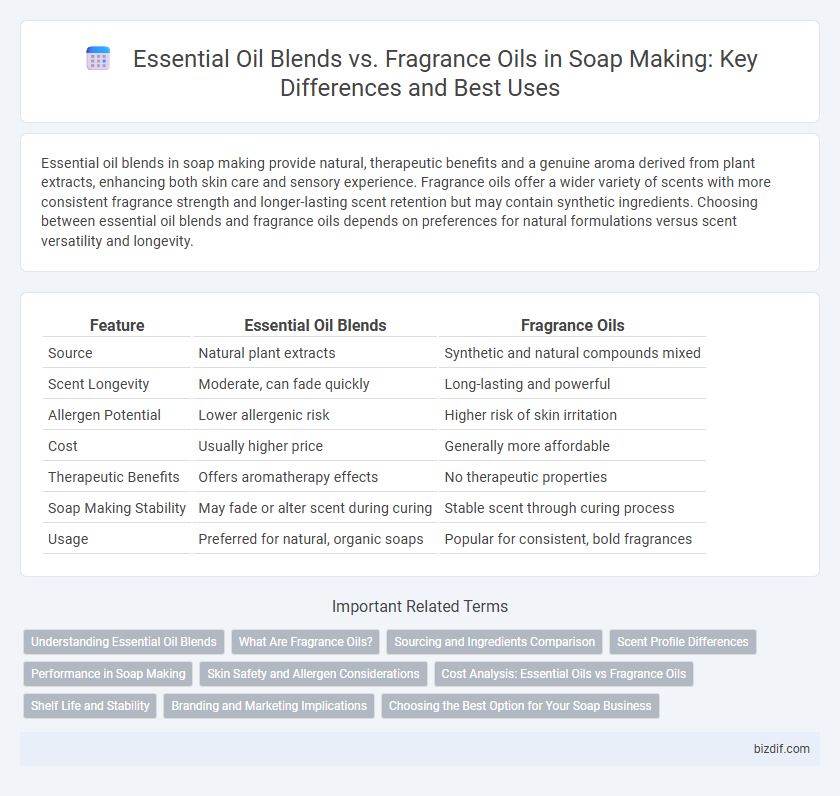Essential oil blends in soap making provide natural, therapeutic benefits and a genuine aroma derived from plant extracts, enhancing both skin care and sensory experience. Fragrance oils offer a wider variety of scents with more consistent fragrance strength and longer-lasting scent retention but may contain synthetic ingredients. Choosing between essential oil blends and fragrance oils depends on preferences for natural formulations versus scent versatility and longevity.
Table of Comparison
| Feature | Essential Oil Blends | Fragrance Oils |
|---|---|---|
| Source | Natural plant extracts | Synthetic and natural compounds mixed |
| Scent Longevity | Moderate, can fade quickly | Long-lasting and powerful |
| Allergen Potential | Lower allergenic risk | Higher risk of skin irritation |
| Cost | Usually higher price | Generally more affordable |
| Therapeutic Benefits | Offers aromatherapy effects | No therapeutic properties |
| Soap Making Stability | May fade or alter scent during curing | Stable scent through curing process |
| Usage | Preferred for natural, organic soaps | Popular for consistent, bold fragrances |
Understanding Essential Oil Blends
Essential oil blends in soap making consist of natural plant extracts known for therapeutic properties and aromatic complexity, offering benefits such as skin nourishment and aromatherapy effects. These blends vary widely depending on the combination of labeled essential oils like lavender, eucalyptus, and peppermint, each contributing unique volatile compounds and scents. Understanding essential oil blends helps soap makers create natural, skin-friendly products with authentic fragrance profiles that differ significantly from synthetic fragrance oils.
What Are Fragrance Oils?
Fragrance oils are synthetic or natural aromatic compounds specifically formulated to mimic natural scents or create novel fragrances, often used in soap making for consistent and long-lasting aroma. These oils are typically made from a combination of essential oils, aroma chemicals, and solvents, designed to enhance scent stability and versatility compared to pure essential oils. Soap makers prefer fragrance oils for their wide range of unique scents, cost-effectiveness, and ability to retain fragrance during the saponification process.
Sourcing and Ingredients Comparison
Essential oil blends are derived from natural plant extracts, ensuring organic sourcing with therapeutic properties and complex chemical compositions that vary based on harvesting conditions. Fragrance oils, on the other hand, are synthetic or partially synthetic compounds created in laboratories, offering consistent scent profiles but lacking the natural variability and holistic benefits of essential oils. Sourcing essential oils involves sustainable agricultural practices and seasonal factors, while fragrance oils rely on petrochemical or synthetic raw materials designed for stability and cost-effectiveness in soap making.
Scent Profile Differences
Essential oil blends offer natural, complex scent profiles derived from botanical sources, providing aromatic notes that evolve subtly over time, enhancing the soap's therapeutic qualities. Fragrance oils are synthetically formulated to replicate a wide range of scents with consistent intensity and longevity, often delivering more potent, vibrant aromas. The choice between essential oil blends and fragrance oils significantly impacts the soap's olfactory experience, longevity, and potential skin sensitivity.
Performance in Soap Making
Essential oil blends offer natural antibacterial and therapeutic properties that enhance soap's skin benefits but may have lower scent retention and faster fading compared to fragrance oils. Fragrance oils provide a wider variety of consistent, strong scents with excellent longevity and color stability, making them ideal for long-lasting fragrance in soap. Choosing between essential oil blends and fragrance oils depends on desired soap performance, with fragrance oils excelling in scent durability and essential oils contributing natural skin benefits.
Skin Safety and Allergen Considerations
Essential oil blends used in soap making are derived from natural plant extracts, offering therapeutic benefits and generally lower allergen risks compared to synthetic fragrance oils, which often contain chemical compounds that can irritate sensitive skin. Careful selection of essential oils with known skin-safe profiles and appropriate dilution is crucial to minimize allergic reactions and ensure product safety. Testing for common allergens such as limonene, linalool, and eugenol is recommended when formulating both essential oil blends and fragrance oils to protect consumers with sensitive skin.
Cost Analysis: Essential Oils vs Fragrance Oils
Essential oils typically incur higher costs due to their natural extraction processes and plant source variability, making them pricier per ounce compared to synthetic fragrance oils. Fragrance oils offer a more budget-friendly option with consistent scent profiles and longer shelf life, reducing overall production expenses in soap making. Choosing between essential oils and fragrance oils hinges on balancing the desired soap quality, scent purity, and cost efficiency for large-scale or artisanal batches.
Shelf Life and Stability
Essential oil blends typically have a shorter shelf life of 1 to 2 years due to their natural volatile compounds, which can degrade or oxidize over time. Fragrance oils, often synthetic or a combination of natural and synthetic ingredients, usually exhibit greater stability and a longer shelf life of 3 to 5 years. Proper storage in cool, dark conditions can extend the longevity of both essential and fragrance oils used in soap making.
Branding and Marketing Implications
Essential oil blends create a natural, high-quality brand image that appeals to eco-conscious consumers seeking authentic aromatherapy benefits. Fragrance oils offer greater variety and consistency, allowing brands to develop distinctive scents that enhance product differentiation and market positioning. Choosing essential oils can elevate brand storytelling around wellness and purity, while fragrance oils provide flexibility for seasonal or thematic collections that boost customer engagement.
Choosing the Best Option for Your Soap Business
Essential oil blends offer natural, therapeutic benefits and align with eco-conscious consumer preferences, enhancing your soap's market appeal. Fragrance oils provide a wider variety of long-lasting scents and consistent aroma performance, ideal for scalable soap production. Selecting the right option depends on balancing purity, scent diversity, cost, and target audience preferences to maximize your soap business success.
Essential Oil Blends vs Fragrance Oils Infographic

 bizdif.com
bizdif.com